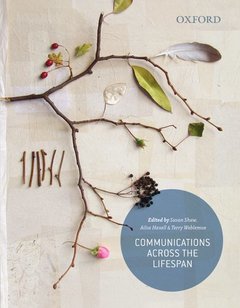Description
Communication across the lifespan
Authors: Shaw Susan, Haxell Ailsa, Weblemoe Terry
Language: English
Subjects for Communication across the lifespan :
Publication date: 03-2012
396 p. · 18.6x24.7 cm · Paperback
Out of Print
396 p. · 18.6x24.7 cm · Paperback
Out of Print
Description
/li>Contents
/li>Biography
/li>
Communication Across the Lifespan combines communication and lifespan development, in order to equip students entering health, disability and related fields with the skills they need to engage effectively with people of all ages and life experiences. The book gives a sound introduction to the essential concepts of therapeutic communication across the lifespan within the New Zealand environment, and is informed by current issues and debate, designed to encourage critical thinking and reflection. Health and wellness issues are covered from the perspective of patients and professionals which enable students to hear what patients say and to explore their own lived experience of health and illness.
PART 1 COMMUNICATION AND DEVELOPMENT. 1. Introducing Communication aamp, Development. PART 2 LIFESPAN DEVELOPMENT. 2. The Antenatal Journey. 3. Birth and Neonate. 4. 'MY do it!' Communication with Babies and Young Children. 5. School Age. 6. Teens. 7. Early Adulthood. 8. Middle Years. 9. Senior Years. 10. Death, Grief and Bereavement. PART 3 COMMUNICATION AND HUMAN ENGAGEMENT. 11. Communication and survival. 12. Access and Communication. 13. Power Relations. 14. Culture. 15. Social and Interpersonal Dynamics. 16. Touch. 17. Media. 18. Types of Messages. 19. Language and Vocabulary. 20. Style and Manner. 21. Receiving the Message. 22. Written Communication. 23. The Electronic Message. 24. Creative Messages. PART 4 PROFESSIONAL COMMUNICATION. 25. Professional Communication. 26. Therapeutic Engagement. 27. Care at a Distance.
Susan Shaw, BN, MEd Admin (Hons), EdD, Dip Tchg (Primary), NZRGON. Susan has worked at AUT since 1992 and is currently Associate Dean and a director of the National Centre for Interprofessional Education and Collaborative Practice (NCIPECP) within the Faculty of Health and Environmental Sciences. Ailsa Haxell, BA, MHSc (Hons), PGCertEd (Management), Dip Nursing. Ailsa is currently completing a PhD on change and the use of emergent technologies through Deakin University in Melbourne. Ailsa is a senior lecturer in the Faculty of Health and Environmental Sciences at AUT. Terry Weblemoe, BA, MA, RN. Terry has had a lifelong interest in indigenous cultures and health, and has worked as a registered nurse in New York, Florida, and New Zealand. She has worked in various nursing and education roles and has been involved in several research projects with M?ori.
© 2024 LAVOISIER S.A.S.
These books may interest you

Perceptions of Health and Illness 160.25 €



